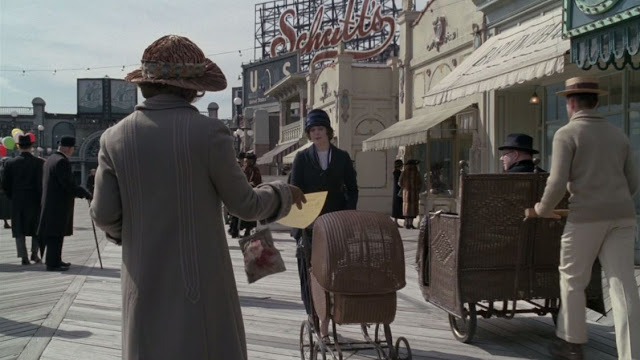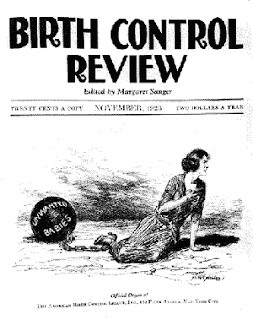In 1923, Margaret Sanger opened the first legal birth control clinic in America.
Almost 90 years later, HBO’s Boardwalk Empire is reminding audiences of those early struggles for women’s reproductive health and education, which don’t seem as foreign as they should.
In the premiere episode of season 3, Margaret (Schroeder) Thompson hears a radio story about Carrie Duncan, a woman who is about to take off as the first aviator to attempt a cross-continental flight.
Later in the episode, she takes a private tour of the Enoch and Margaret Thompson Pediatric Annex in St. Theresa’s Hospital, as she and her husband (“Nucky”) are its benefactors. As she tours the halls, a pregnant woman comes in and collapses, and she’s obviously miscarrying. The doctors whisk her away and Dr. Mason later tells Margaret that the loss could have been prevented, but the woman (her name is later revealed as Edwina Shearer) drank raw milk that was infected with E.coli. He goes on to explain that pregnant women are not given any instruction about nutrition or hygiene. Margaret, horrified, wants to use her benefactor status to change this.
 |
| Edwina Shearer has a miscarriage in the first episode of season 3. |
At her and Nucky’s New Year’s celebration–they are ringing in 1923–she approaches Dr. Landau (St. Theresa’s medical director) about the inadequate prenatal care at the hospital. He is insulted and condescending, and Nucky chastises her.
However, as her determination and tenacity in the last two seasons has proven, Margaret will not stand down.
At the end of the episode, Margaret gets up at dawn to witness Duncan fly over the coast. She smiles as she sees Duncan’s plane.
 |
| Margaret watches Carrie Duncan fly overhead. |
While Margaret’s feminist activism is a sub-plot–in fact, it doesn’t even appear in every episode–the establishment of a prenatal education program (and evolving views on birth control) is an important, sobering reminder of our history and provides context for much of what propels current conversations on reproduction and women’s health.
Margaret manages to open the St. Theresa’s Women’s Clinic after going above the director’s head to appeal directly to the bishop (although he warns her that “delicate topics would have to be avoided”). Margaret has become a power player in season 3. Certainly it’s worth noting that the hospital’s namesake could either be found in St. Therese of Lisieux, who went directly to the Pope to beg to become a nun after priests and bishops had turned her away, or St. Teresa of Avila, who was forced into the convent by her father and then became a reformer and was posthumously declared a Doctor of the Church.
Margaret, also, has been dually wedged into circumstances by her own stubborn motivations and by the men in her life. In previous seasons, she has deftly navigated her world to provide better circumstances for her children and her community, but this season she is securing her place as more than just an activist–she is a leader.
In episode 4, she and Dr. Mason set up the women’s clinic and are met with resistance by the nuns. As they discuss the mission statement, a nun says, “This is rather infelicitous language, isn’t it?” “Vagina?” Margaret asks. The doctor says that it’s a medical term, and the nun replies, “I’ve never enjoyed the sound of it.” Dr. Mason says, “I’ve never liked brussels sprouts, but I don’t deny they exist.”
 |
| Dr. Mason, left, and Margaret prep for their evening women’s health class (they are holding boxes of Kotex, and the nun in the background disapproves). |
“The entire area is problematic,” the nun scoffs, adding that she doesn’t approve of the term “pregnant.”
“You are at odds with ‘menstruation’?” Margaret asks.
The nun finally storms off after seeing brown packages that Margaret tells her are Kotex–a relatively new product–which are gifts for the women in the class. “Let’s hope our evening students aren’t quite so sensitive,” Margaret quips.
As she passes out fliers for the new class on the boardwalk, she runs in to Mrs. Shearer–the woman who inspired the clinic. She seems uncomfortable, and her husband interjects, “When she’s feeling better, we’ll try again.”
 |
| Margaret passes out flyers on the boardwalk. |
At the end of the episode, Margaret is reading the newspaper. Wreckage of Carrie Duncan’s plane was found, and the headline reads “Aviatrix Presumed Killed During Ill-Fated Journey.” Duncan’s trip, which clearly was inspirational to Margaret, was unsuccessful.
This moment in American history–the 1920s–was a promising time for women. The 19th amendment granted women the right to vote in 1920, and Margaret Sanger was making headway (and finding loopholes) to help women plan their reproduction.
However, there were no figurative cross-country flights completed during this era. It would be decades before the Pill was legalized and first-trimester abortion de-criminalized. Still in 2012, contraception is a divisive issue in America.
But women kept fighting, as does Margaret.
In the beginning of the next episode, she’s looking over a class flyer with a friend. “Do you wish for more knowledge? sounds mystical,” her friend teased.
Margaret responds, “I can’t very well say Let’s talk about your vagina.”
Later in the episode, Dr. Mason is wrapping up their evening women’s education class (a crucifix looms above him), and one of the few women in the class says, “I wish someone would have told me all of this when I was 13–I wouldn’t have thought I was dying!”
The need for comprehensive education was clear, and for the few women who came to the first classes, Margaret and Dr. Mason were making a difference.
When Dr. Mason is called into an emergency surgery during their next class, Margaret steps to the front of the room and smiles. “We have our book, we have our chart, we have ourselves–what else is needed?”
She’s gotten the permission she needed to open the clinic and fly under the radar of the conservative leadership, and she is comfortable taking the lead.
At the beginning of episode 6, Margaret opens the mail and pulls out a copy of the Birth Control Review (along with a letter signed by Margaret Sanger).
 |
| Margaret receives a copy of Margaret Sanger’s Birth Control Review in the mail,. |
This isn’t the first time that Sanger has appeared in Boardwalk Empire. In season 1, the episode “Family Limitation” (named after a brochure of the same name that Sanger produced in the early 1900s) showed Margaret douching with Lysol to prevent another pregnancy (a method that was touted as a method of birth control). Season 1–with its focus on temperance leagues, suffrage and reproductive issues–offered a preview to the show’s complex sub-plots that focus on women’s issues.
Throughout the series, men’s reactions to birth control and family planning have been venemous (Nucky referred to Margaret as a “common whore” when he discovered she’d been trying to prevent pregnancy, and Mr. Shearer insists that he and his wife will continue to procreate). Dr. Mason is the exception thus far in his progressive attitudes about women’s health.
In episode 8, Mrs. Shearer comes to Margaret, pleading. “My husband won’t keep off me,” she says, and wants to know how to not get pregnant.
She says, “I don’t need a pamphlet, or some man to tell me what I already know.”
She hesitates, and says, “I wasn’t–I stored the milk, I waited. It wasn’t an accident, you understand? I drank it on purpose to lose the baby–I won’t go through that again.”
The E.coli was self-inflicted, because she refused to have another child. This example of self-induced abortion was nothing new or rare for the time, and it was one of the reasons Sanger pushed for education and birth control.
Without judgment, Margaret simply asks, “What do you need?”
“One of those Dutch caps, that go up here,” she answers (indicating a diaphragm).
When Margaret says that those need to come from a doctor, Mrs. Shearer says, “Doctors only listen to ladies like you.”
Wealthy women of privilege generally have always had access to family planning. Mrs. Shearer knows that, and finally trusts Margaret enough to be a connection between working class exclusion and upper class privilege.
Margaret waits for Dr. Mason outside of the hospital, and tells him directly, “I need your help with something and it’s rather delicate… I would like to ask you to help me obtain a diaphragm.” He understands that that is what Mrs. Shearer wanted. “Actually,” Margaret adds, “I suppose I need two–one for her, and one for me.” (Margaret’s need for a diaphragm isn’t because of her relationship with Nucky; Nucky has had a mistress in the city, and Margaret picks up her affair with his driver, Owen.)
The issues surrounding the female characters of Boardwalk Empire are instrumental in the male characters’ lives (the late Angela Darmondy and her lesbian relationship, Gillian Darmondy’s brothel the Artemis Club, Chalky White’s daughter’s resistance to marriage, Assistant Attorney General Esther Randolph–based off Mabel Walker Willebrandt, Nucky’s late lover Billie Kent’s desire for independence and of course, Margaret), and they also serve as history lessons for the audience.
Boardwalk Empire is, essentially, a boys club. So is American history. While Nucky’s world of politics, power, alcohol smuggling and bloody violence is central to the entire plot of the show, the women’s stories underneath the surface are integral to their stories and to the audience.
In 2012 America, a female legislator was punished for using the word “vagina” in a debate about reproductive choice. Religious groups are fighting the Affordable Care Act’s provision that contraception be covered by insurance as preventative medicine. States are attempting to close women’s health clinics that don’t even provide abortion, but provide women’s health services. Abstinence-only education is pushed nationwide. The same resistance that Margaret faces in Boardwalk Empire is the same resistance faced by activists and leaders in today’s fights to prioritize reproductive education, health and choice.
By showing these struggles in an award-winning, critically acclaimed HBO drama, audiences are able to hold a mirror up to the failures of not only prohibition, but also limiting women’s reproductive choices. Boardwalk Empire serves as a reminder that when women’s options are limited, they will fight back–even if it means risking their lives. With only three episodes left in season 3, we can hope that Margaret will remain steadfast in her fight for women’s reproductive education and choice.
—
Leigh Kolb is a composition, literature and journalism instructor at a community college in rural Missouri.

